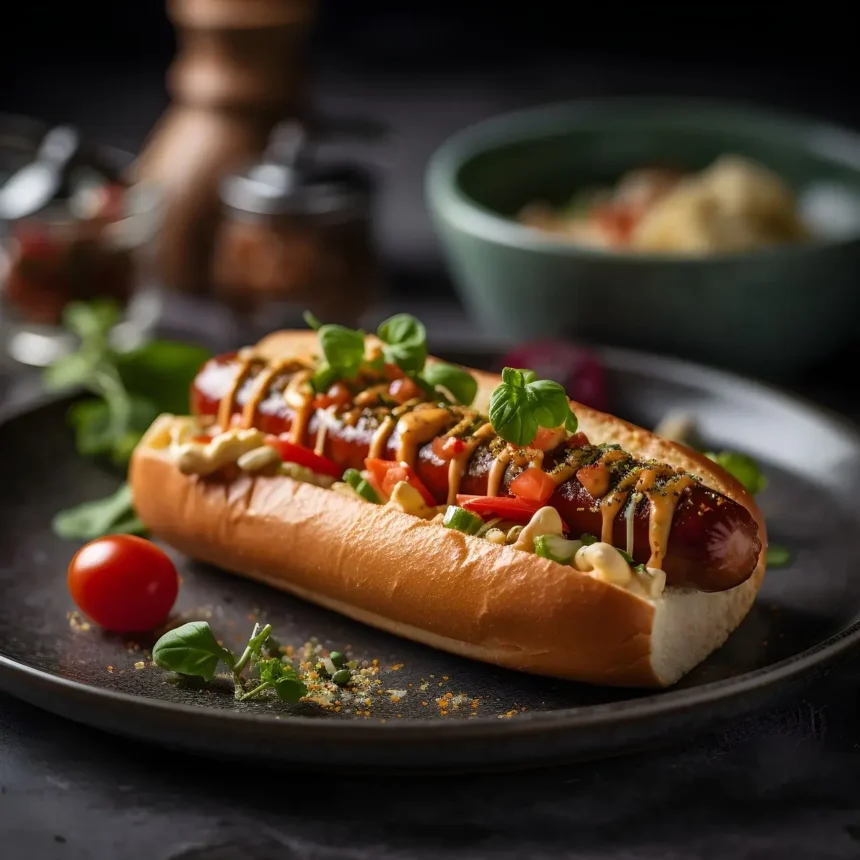Synopsis
North Korea’s strict views on culture and foreign influences have led to some unusual policies. One of the most surprising is the ban on eating hotdogs, which the government has made a criminal act. This article looks 7 Shocking Reasons Eating Hotdogs Is Treason in North Korea.
We’ll explore how the regime uses political propaganda, enforces cultural identity, and pushes anti-Western policies to maintain control.
At a Glance
- Hotdogs are banned in North Korea due to anti-Western sentiment.
- Consuming hotdogs is seen as adopting Western cultural practices.
- The act of eating hotdogs symbolizes rebellion against state ideologies.
- North Korea’s leadership enforces strict food cultural norms.
7 Shocking Reasons Eating Hotdogs Is Treason in North Korea
In many countries, eating hotdogs is a common and enjoyable activity. However, in North Korea, it is seen as a dangerous and even treasonous act. The government associates hotdogs with Western influence and views them as a threat to its strict ideology. This simple food has become a symbol of rebellion and cultural infiltration.
But why is something so ordinary treated with such severity? In this article, we explore seven surprising reasons behind North Korea’s strict ban on hotdogs.
1. Symbol of Western Influence
Hotdogs, a quintessential Western food, are viewed as symbols of Western cultural invasion. North Korea’s regime fiercely opposes anything that could dilute its traditional values or promote foreign influences.
2. Violation of Cultural Identity
The North Korean government emphasizes self-reliance (Juche ideology) and cultural purity. Eating a hotdog is seen as betraying the country’s heritage by embracing Western customs.
3. Propaganda Against Foreign Foods
State propaganda often vilifies foreign foods, including hotdogs, as unhealthy and corrupting. This discourages citizens from adopting “capitalist” lifestyles.
4. Hotdogs as a Symbol of Rebellion
Choosing to eat a hotdog can be interpreted as a silent protest against the regime. This act of defiance may be punished harshly to maintain strict obedience.
5. Strict Food Policies in North Korea
Food is tightly controlled in North Korea. The introduction of “non-native” foods is prohibited to reinforce the idea of national self-reliance. Hotdogs are seen as unpatriotic and unnecessary luxuries.
6. Fear of Westernization
The North Korean leadership fears that exposure to Western lifestyles, starting with small cultural habits like eating hotdogs, could weaken its control over citizens.
7. Severe Penalties as a Warning
The regime uses extreme measures, such as branding hotdog consumption as treason, to deter any behavior that contradicts its doctrines. This tactic instills fear and enforces conformity.
TN HEADLINES24 INSIGHTS
North Korea’s ban on eating hotdogs shows how far the country goes to maintain its strict ideology. The government views hotdogs as a symbol of Western culture, which it sees as a threat to its traditional values and political control. By banning such foods, the regime tries to prevent any influence that might weaken its grip on the people.
This reflects the broader political tensions between North Korea and Western nations. The leadership fears that even small cultural changes, like eating foreign foods, could lead to larger challenges to its authority. This obsessive focus on protecting its culture often leads to extreme policies. Propaganda reinforces this ban by portraying Western foods as corrupting and harmful.
The strict rules also ensure that citizens comply with the regime’s ideology without question. Ultimately, the ban is less about food and more about maintaining control. It highlights how the government uses fear to enforce its authority over every aspect of life.
TN HEADLINES24 READERS’ INSIGHTS
This policy raises serious questions about the balance between cultural preservation and personal freedom. While protecting traditions is important, labeling something as simple as eating a hotdog as treason feels extreme and controlling. It highlights the lengths to which governments can go to enforce conformity. Does cultural preservation justify such harsh measures? Share your thoughts and join the conversation in the comments!
TN HEADLINES24 BOTTOM LINE
The ban on eating hotdogs in North Korea shows how tightly the government controls its citizens’ lives. This isn’t just about banning a type of food—it’s a way for the regime to enforce its strict ideology. By targeting something as simple as hotdogs, the leadership aims to eliminate even small influences from the outside world. They see this as a way to protect their culture and maintain power.
However, such extreme measures highlight how far the government will go to silence any perceived threats. It’s less about food and more about control. This policy reflects a deep fear of change and outside influence. It’s a clear example of how tightly North Korea guards its sovereignty.
North Korean policies
Reference: https://www.amnesty.org
TN HEADLINES24 QUIZ | TEST YOURSELF
10 Multiple Choice Questions
1. Why are hotdogs banned in North Korea?
A. Health reasons
B. Symbol of Western influence
C. Lack of resources
D. Religious beliefs
2. What ideology emphasizes self-reliance in North Korea?
A. Democracy
B. Socialism
C. Juche
D. Capitalism
3. How does North Korea view foreign foods like hotdogs?
A. Healthy alternatives
B. Symbols of cultural betrayal
C. Expensive luxuries
D. Common snacks
4. What does eating a hotdog symbolize in North Korea?
A. Cultural appreciation
B. Rebellion
C. Wealth
D. Religious devotion
5. What is the main fear of the North Korean regime about Western food?
A. Overpopulation
B. Increased dependency
C. Westernization
D. Lack of nutritional value
6. How does the regime enforce its strict food policies?
A. Encouraging foreign trade
B. Harsh penalties
C. Providing food alternatives
D. Relaxed policies
7. Why does North Korea emphasize cultural purity?
A. To attract tourists
B. To preserve traditions and power
C. To promote global influence
D. To reduce costs
8. What ideology influences the North Korean ban on hotdogs?
A. Democracy
B. Juche
C. Western values
D. Capitalism
9. How is hotdog consumption portrayed in state propaganda?
A. Healthy and nutritious
B. Harmful and corrupting
C. Traditional and patriotic
D. Modern and innovative
10. What is the regime’s ultimate goal in banning foreign foods?
A. Increasing exports
B. Strengthening political control
C. Promoting tourism
D. Encouraging Westernization
TN HEADLINES24 | VOCABULARY CHALLENGE
10 Multiple Choice Questions
1. What does “treason” mean?
A. Loyalty
B. Betrayal of one’s country
C. Patriotism
D. Obedience
2. What does “symbolize” mean in the context of the article?
A. Represent
B. Ignore
C. Reject
D. Hide
3. What is “propaganda”?
A. Biased information to influence opinions
B. Honest news reporting
C. Scientific evidence
D. Financial data
4. Define “Westernization.”
A. Adopting Western culture and practices
B. Preserving local traditions
C. Avoiding foreign influence
D. Promoting Asian cultures
5. What is the meaning of “ideology”?
A. Random thoughts
B. A system of ideas and ideals
C. Physical practices
D. Superstitions
6. What does “cultural purity” mean?
A. Embracing all cultures
B. Preserving one’s own traditions
C. Rejecting traditions
D. Blending global customs
7. Define “self-reliance.”
A. Depending on others
B. Independence
C. Seeking help
D. Collaborative work
8. What does “rebellion” signify in the article?
A. Obedience
B. Defiance against authority
C. A legal act
D. A peaceful agreement
9. What is the meaning of “anti-Western”?
A. Favoring Western values
B. Opposing Western influence
C. Ignoring cultural values
D. Encouraging Western trade
10. Define “cultural infiltration.”
A. Mixing global traditions
B. Introduction of foreign influence
C. Preserving local customs
D. Cultural education
Answers
Test Yourself Quiz:
1. B, 2. C, 3. B, 4. B, 5. C, 6. B, 7. B, 8. B, 9. B, 10. B
Vocabulary Challenge:
1. B, 2. A, 3. A, 4. A, 5. B, 6. B, 7. B, 8. B, 9. B, 10. B
Disclaimer
This content is for informational and educational purposes only. It is based on research and publicly available sources. The views expressed do not reflect those of TN HEADLINES24 or its affiliates. Readers are encouraged to cross-verify the information independently. TN HEADLINES24 does not endorse or promote any political opinions or ideologies. Any resemblance to real events is purely coincidental. All rights reserved by TN HEADLINES24.




